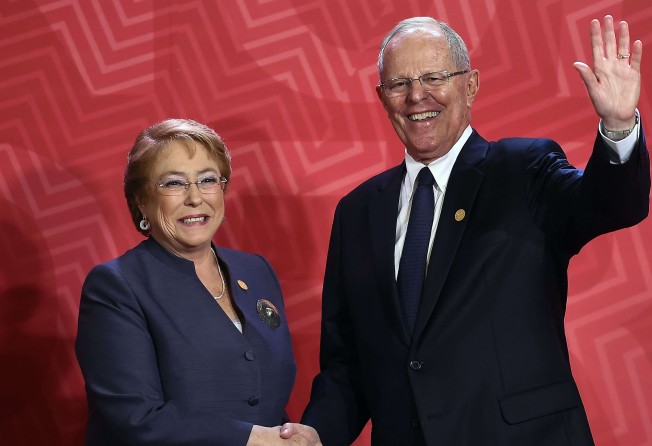
Latin American economies look to China for free trade options
As US backing of the TPP looks shaky under Trump, Chile and Peru consider Beijing-backed alternative

Latin American economies are looking for options from China and beyond amid worries that US President-elect Donald Trump will withdraw from free trade agreements, officials say.
Paulina Nazal Aranda, Chile’s vice-minister of trade, said the South American nation is open to other option if the Trans Pacific Partnership (TPP), a 12-nation trade agreement led by the United States, proves unworkable.
Chile, a trade liberalisation proponent in the region, joined Peru and Mexico as the three Latin American nations among 12 countries that signed the TPP earlier this year.

“Free trade is an important pillar in our economic development,” Aranda said on the sidelines of the Asia-Pacific Economic Cooperation (Apec) summit in Lima, Peru. “Chile chooses openness to the world and we took that option many years ago, and most of us see trade as a way to drive economic growth.”
The spirit of free trade is facing challenges after Trump, a businessman-turned-politician who has repeatedly railed against free trade and threatened to scrap trade deals including the TPP, won the US presidential election two weeks ago.
Aranda said Chile would not give up TPP at the last minute, and urged the world to be patient as it would take “time to really know” the future of trade policy under a Trump administration.
She laid out options for the future of the TPP, including adding clauses suggested by the Trump administration, or even going ahead without the US.
“We are open to flexible ways to try, but we don’t want to declare the agreement is dead,” she said. “Because we are really convinced that it is an good agreement. We don’t want to lose it.”
One option, she said, was the Regional Comprehensive Economic Partnership (RCEP), a proposed free trade agreement that is expected to conclude negotiations next year that involves 10 Association of South East Asian Nations members plus China, Japan, South Korea, New Zealand, Australia and India.
Aranda said Chile had expressed interest in also joining the RCEP, which is backed by China and notably excludes the US.
She said Chile would be happy to join the RCEP but had been told negotiations would be concluded next year, so would wait to see “if there’s any special clause to add new members to the agreement”.
Peru, another signatory nation of the TPP, confirmed last week that it has started talks with China about joining the RCEP, though it still holds hopes for the TPP.
Luis de la Calle, a former Mexican trade negotiator, said on Friday that other TPP members could continue with a modified accord without the US.
China also appears interested in boosting its influence in the American backyard.
In his keynote speech at the Apec summit on Saturday, Chinese President Xi Jinping tried to draw his nation closer to the America’s backyard.
“There is one entry in the English-Chinese dictionary, ‘from China to Peru’, which means all over the world,” Xi said at the beginning of his speech.
He then spoke of sweet potatoes, a common plant that originated in Central and South America.
“I once used the sweet potato as an example to make a point to a group of Chinese business leaders. I said that the vines of sweet potato may stretch in all directions, but they all grow out of its roots,” Xi said. “Similarly, no matter what level of development it may reach, China, with its roots in the Asia-Pacific, will continue to contribute to its development and prosperity.”